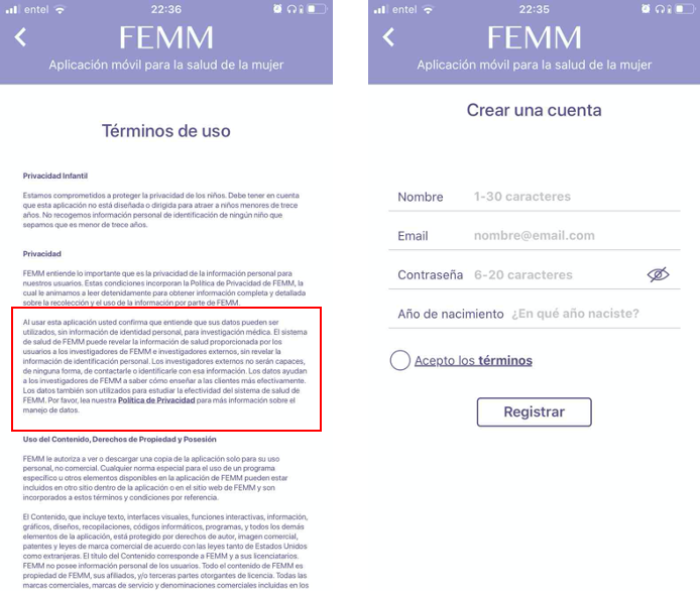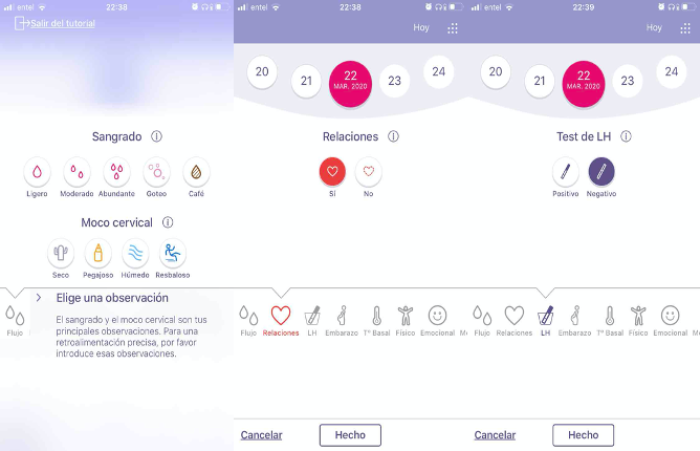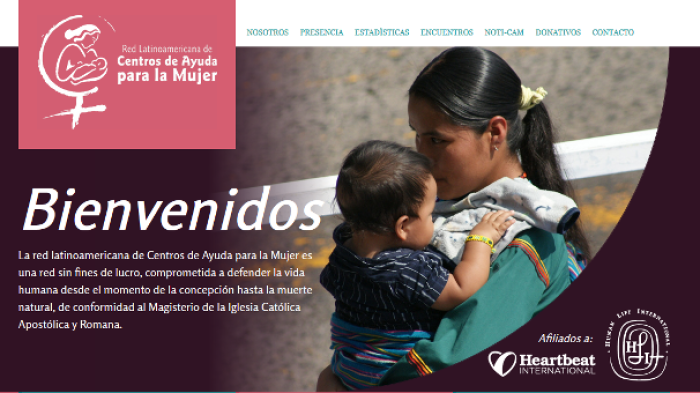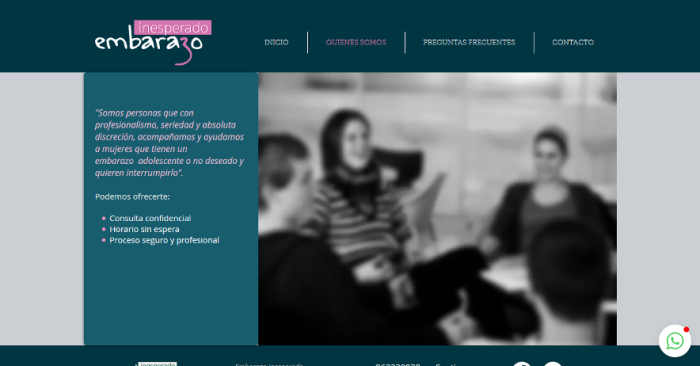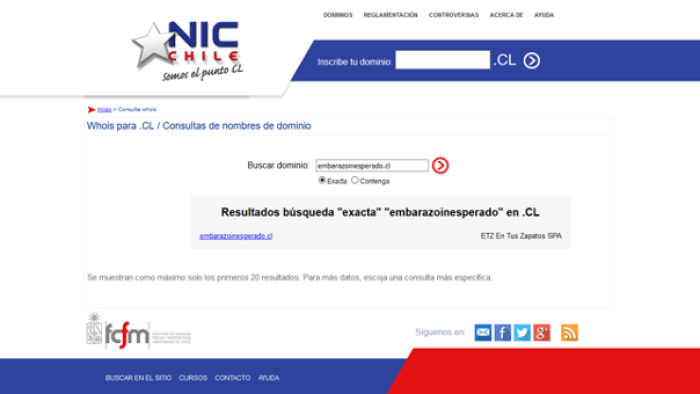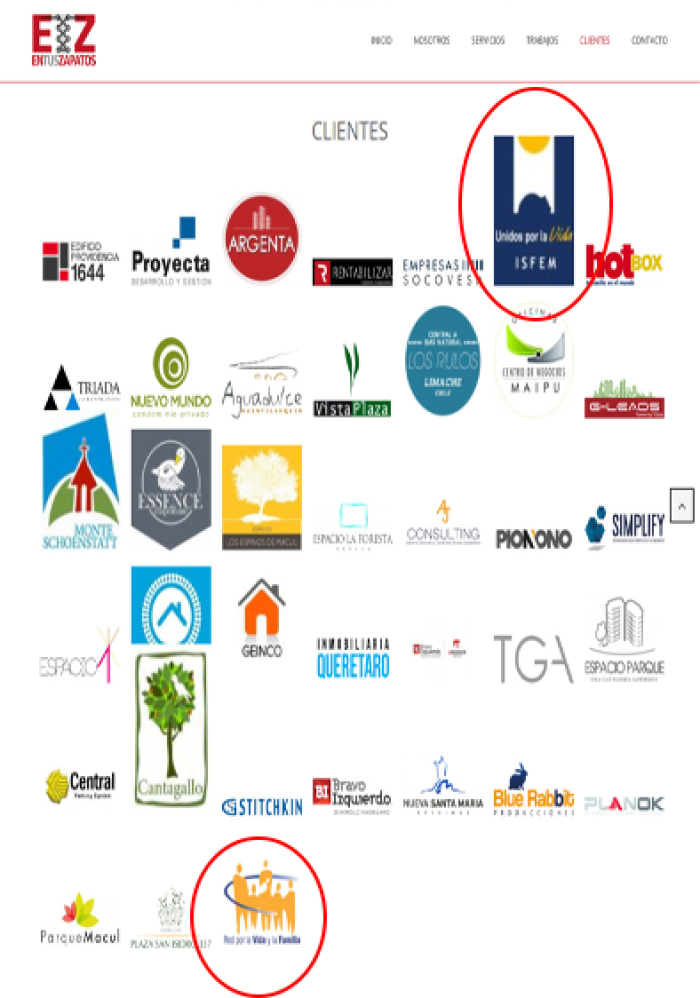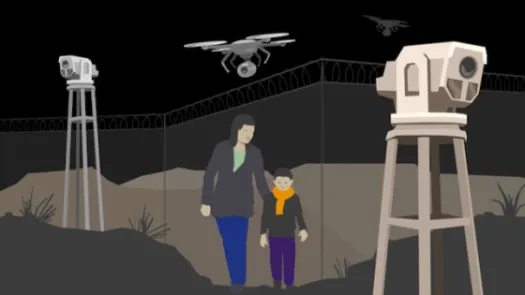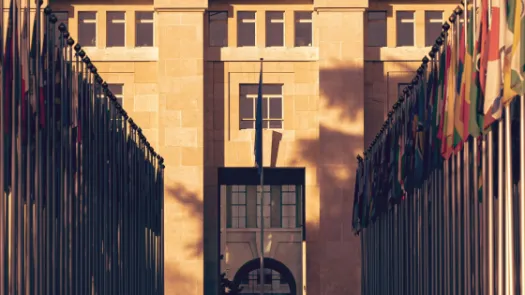
Country case-study: sexual and reproductive rights in Chile
This country case-study was informed by research carried out by Paz Peña.
- Even in circumstances where abortion is legal, significant pressure exists on healthcare professionals to avail themselves of the "conscientious objector" exemption and refuse assistance
- Websites managed by anti-abortion groups resort to similar strategies to attract the abortion-minded woman
- There are increasing connections between local and international anti-abortion organisations

1. What are the barriers to access safe and legal abortion?
2. What are the barriers to access basic contraception?
3. What are the hurdles in accessing non-biased medical reproductive health information?
4. What are the concerns regarding the use of technology by anti-abortion organisations?
5. What foreign organisations have a large anti-reproductive rights presence?
This research was produced by Paz Peña as part of Privacy International’s global research into data exploitative technologies used to curtail women’s access to reproductive rights. Reproductive Rights and Privacy Project. Read about Privacy International’s Reproductive Rights and Privacy Project here and our research findings here.
1. What are the barriers to access safe and legal abortion?
According to figures from the Ministry of Health, more than 33 thousand clandestine abortions are performed per year, which is equivalent to 90 each day, most with Misoprostol. But the figure is inaccurate because, as it is a penalized practice save for the exceptions provided by the law, there are no records, and data comes from estimates.
The implementation of the current law, however, presents significant hurdles for women, as:
- "Conscientious objectors": The law allows doctors, as well as private hospitals (institutional objectors), to refuse to provide abortions on moral grounds. According to the Human Rights Watch Report on Chile 2019, "nearly 50 percent of all medical providers in Chile object to providing abortions after rape, and some public hospitals lack a single provider willing to perform an abortion in that circumstance".
- No confidentiality: By law, women are entitled to ask for (and expressly authorize) an accompaniment program. It can be provided by hospitals or by the three accredited NGOs (APROFA and Miles Chile and the conservative Chile Unido). According to a CIPER report in 2019, both avenues have serious problems, as, for example, the precarious conditions of their work that do not ensure patient confidentiality as they work with women between corridors and even in gynaecological beds. Moreover, they denounce that the medical teams do not integrate them, that the training is insufficient, and, in some cases, they suffer the hostility of conscientious objectors.
To get an abortion for reasons not included in the law, women must avail themselves of illegal methods clandestinely:
- The black market of Misoprostol. The free purchase of Misoprostol in pharmacies is forbidden since 2009, and the only way to get it is under a medical prescription. Women in Chile have two ways to get help in this context. One way is contacting feminist groups who deliver information to women around abortion (Línea Aborto Libre, Con las Amigas y en la Casa, Miles Chile, etc.). The second way is purchasing Misoprostol in the black market, at a much higher price and with no guarantee of the integrity of the product, which could be extremely dangerous for women. Moreover, "the search for an abortion without the proper legal channels can lead to humiliating, violent and risky situations with abusive people who, because of the law, become victims who are unable to report."
- Illegal abortions. Clinics and doctors can perform unlawful abortions [1]. Upper classes can get abortions in private clinics if they have the resources for that. However, "not all women in Chile who want abortions can find the means to do so. In particular, due to numerous oppressive institutions and social structures, poor, rural, and immigrant women often are left without the resources, whether it be money or connections, to purchase pills or to go to a clinic for an abortion".
2. What are the barriers to access modern contraception?
According to the Chilean Association for Family Protection (APROFA - Asociación Chilena de Protección de la Familia), although Chile has an entire legal system and a clear national policy regarding access to contraceptive methods for women, barriers remain which are affecting mainly the most vulnerable and youngest population.
One significant barrier is pricing to purchase contraceptive methods in the market. According to the National Consumers Service's data, the prices have climbed an impressive 67 % in just four years. APROFA has highlighted the fact that the public health service in Chile offers free access to eight contraceptive methods and it seems vital to amplify that offer, including contraceptive methods for men, as not everyone knows this service is available.
Gynecologist David Eisen thinks there is a gap between what the regulation says and what it happens on the ground. In his experience, every woman confronts everyday obstacles in health services, mainly because of a lack of information on how to get it, and sometimes because these health care professionals who do not necessarily have the latest knowledge on contraceptive methods.
3. What are the hurdles in accessing non-biased medical reproductive health information?
It is important to address that the main barrier for access to sexual and reproductive rights is cultural; thus, there are historical hurdles to get a non-biased medical reproductive health information. As Lieta Vivaldi describes:
Despite Chile being one of the least religious countries of the region, experiencing an increasing secularisation, it is crucial to notice the strong influence of religious ideas in sexual and reproductive rights policies: through the State and political parties, and working in complicity with think tanks and the civil society.
This conservative influence has deployed its power in many ways. One of the most critical ways is the idea of having as many doctors and private hospitals that declare themselves conscientious objectors for abortion on the three grounds admitted by law. According to a study by Corporación Humanas, this excuse is facilitated to the fullest possible extent by the Ministry of Health as it only requires the completion of a form and refrains from requesting any detailed background information:
The broad refusal of public officials [...] reflects the difficulty that health teams face in respecting the decision of women and girls and incorporating elements other than strictly biomedical in the care of users, as well as the prejudices and stigmatization women and girls face
Thus, and according to the Ministry of Health, in 2019, 580 of the 1,148 gynecologist-obstetricians of the public health system declared themselves conscientious objectors to practice abortions in cases of rape, 21% declared themselves conscientious objectors in cases of endangerment of the pregnant woman's life (238), and 29% did the same in cases of fetal infeasibility (328). In the case of anesthetists, one in four (26%) prefers not to perform abortions when the girl or woman became pregnant due to rape.
The Centro de Investigación e Información Periodística (CIPER), a non for profit organisation which promotes investigative journalism, has also documented that doctors who are not objectors are pressured by heads of hospitals to change their minds and prevent abortions in their premises.
Moreover, campaigns by conservative groups have been activated online through social media to harass doctors who perform abortions. For example, a photoshopped picture of Gonzalo Rubio, the first doctor who did the procedure under the new legislation, was created and widely shared by a Facebook group called “Cruzada nacional contra el aborto." It is hard to say who is behind this group but it appears to be formed by catholic and evangelicals’ organizations from across Latin America.
The lack of sexual education is another crucial barrier in Chile to get non-biased medical reproductive health information. To date, Chile does not have a comprehensive education policy on sexuality, affectivity, and gender. Chile's indicators show that deficit. For example, between 2008 and 2015, Chile was the country that made the least progress in the prevention of unwanted pregnancies through sex education compared to the other 16 countries that also underwent the study by the International Family Planning Federation (IPPF).
The 2019 Global Annual Report of the Joint United Nations Program on HIV / AIDS revealed that Chile showed the highest rate of new infections annually (34%) in Latin America. Various studies show that the most affected segment of the population is 15 to 25 years old. A specialized commission of the Chilean Congress for this pandemic called for the Ministry of Education to take some responsibility for the increase of infections on account of its failure to design and execute a comprehensive sex education policy. At the time of writing, a bill on comprehensive sex education in educational establishments is being discussed at the Congress, which has also been the target of disinformation campaigns online by conservative groups.
4. What are the concerns regarding the use of technology by anti-abortion organisations?
We have found two ways in which data could be collected and used by conservative organizations to prevent access to information on sexual and reproductive rights in Chile. In all these cases, there are several links (funding, capacity building, networks, etc.) with foreign organizations working locally, regionally, and internationally to erode sexual and reproductive rights.
Technologies being used in the provision or restriction of reproductive health services
Teen STAR (Sexuality Teaching in the context of Adult Responsibility) is an educational initiative that started in the US which promotes abstinence at the expense of other viable alternatives such as contraception. The group present Teen STAR as a developmental age and gender-appropriate curriculum rooted in moral, psychological, and physiological principles, which uses the Billings method of understanding human fertility patterns. Their curriculum is present in 36 countries. Teen STAR was challenged in Croatia on the basis that it did not provide accurate science-based sexual and reproductive health education. In Chile, however, the Ministry of Education has recommended the program, and it is supported by one of the most prestigious universities in the country, the Pontificia Universidad Católica de Chile.
In a 2018 interview, Suzanne Spence, Western Regional Director at Teen STAR in the U.S., talked about the challenges of women in technology. On that occasion, she said that
for the first time in human history, we have the capacity to collect and store enormous amounts of detailed personal data for our interpretation and application. Fertility charting is exactly that! And it is on the rise among women of all ages.
Spence also declared to be worried that some fertility apps “may actually be co-opted from serving her individual needs to serving purely market or socio-politically based motives,” referring to apps based in information from Planned Parenthood:
“Teen STAR questions such use of personal protected health information (PHI) and sees a possible breach of the patient-provider relationship, recommending as an alternative the FEMM app as a perfect complement to Teen STAR’s independent philosophy, which allows users to share their data only if and when they choose.”
According to its narrative, “the FEMM app was designed to help women track their health by observing key biomarkers such as cervical fluid, bleeding, physical symptoms like cramps and acne, and emotional symptoms like depression, moodiness, etc. These biomarkers indicate the hormonal interplay that occurs throughout the cycle. The FEMM app can also assist in preventing or achieving pregnancy. Through charting with the FEMM app, women know the average length of their cycle, the quality and length of their bleeding, the point of ovulation at each cycle, their fertility window, and more”.
Teen STAR and the FEMM app have an intersection with Chile. The FEMM app is developed by FEMM Foundation (Fertility Education & Medical Management), which was founded by Ms. Pilar Vigil (she is now the current Medical Director of the Health program). And Ms. Vigil and her husband, Mr. Miguel del Rio, are the founders of Teen STAR Chile. Moreover, Vigil seems to be the second in command of TEEN Star, just after founder Hannah Klaus.
According to FEMM, the project is “grounded in revolutionary, peer-reviewed research in women’s endocrinology, developed through its research institute, the Reproductive Health Research Institute (RHRI), in Santiago, Chile.” The two physicians leading RHRI are the Chileans Pilar Vigil and Patricio Contreras. Teen STAR Chile, and the foundation behind RHRI, the Asociación instituto de investigación en medicina reproductiva, share the same address in Santiago of Chile.
In May 2018, a Guardian investigation into the FEMM app showed that the app promotes concerns about the safety and efficacy of hormonal birth control, asserting that it may be harmful to a woman’s health and that a safer, “natural” way for women to avoid pregnancy is to learn their cycles. Moreover, The Guardian reported that the FEMM Foundation, a not-for-profit which operates the app, receives much of its income from private donors, including the Chiaroscuro Foundation. This is a charity backed almost exclusively by Sean Fieler, a wealthy Catholic hedge-funder based in New York. Fieler also sits on the board of directors for the FEMM Foundation.
Based on the FEMM Foundation’s annual reports, The Guardian noted they received $618,653 in donations in 2017. The same year, Chiaroscuro gave FEMM $445,500, which amount for the majority of its budget. Chiaroscuro gave an additional $350,000 in 2016, and $1 million in 2015. RHRI is also registered in New York City, in the same address as the FEMM Foundation and another anti-abortion organization called the World Youth Alliance. World Youth Alliance gave FEMM $446,042 between 2016 and 2017, and it also received funding from Chiaroscuro Foundation.
According to The Guardian, even while the app collects personal information about sex and menstruation from users, unlike other fertility apps it has not been accused of monetizing confidential data, for sharing data with third parties, and for its lack of privacy protections. In the FEMM privacy fact sheet, they declare that "FEMM never shares or sells data with third parties. FEMM is not funded by drug or big pharma companies, ensuring that we are free from commercial bias in our science and information, as well as from pressures to monetize data and information provided to us by our users".
However, this affirmation is contradictory to their own Privacy Policy [2] which says that that FEMM assigns a random number to the app installed in a mobile device: "We use this random number in a manner similar to our use of Cookies as described in this Privacy Policy." The Privacy Policy also says that they "may use Cookie information to target certain advertisements to your browser or to determine the popularity of certain content or advertisements." Moreover, they say that the random number cannot be used to identify a person "unless you choose to become a registered user of the App." However, there is no opportunity to use the app while unregistered as a user, as the FEMM app requires users to complete data like name, email, and year of born when opening the application to be able to proceed with using the service.
But what it seems to be more relevant for this research in terms of collection and use of personal and sensitive data to curtail women’s reproductive rights, is how this app hoards and uses almost freely the fertility data for the medical research led by the Reproductive Health Research Institute (RHRI).
Some of the sensitive data fields demanded by the FEMM app (many of them must be completed every day) are:
In their Terms of Use in Spanish [3] FEMM warns users that “the FEMM health system may disclose health information provided by users to FEMM researchers and external researchers, without disclosing personally identifiable information.” This raises the question that even if the app does not disclose personally identifiable information, whether it is ethical to carry out research with fertility data provided by women especially if they don’t know what the goals of the studies are. These ethical questions are even more relevant if this data is used to justify an agenda against reproductive rights based on those 400,000 women around the world who downloaded the app.
Another worrisome aspect is whether Teen STAR promotes the FEMM app in the countries where they have representation. This could be even thornier in Chile, as the Minister of Education acknowledges Teen STAR, and, as we have seen in this report, sexuality, affectivity, and gender programs in education have clearly failed in many aspects, according to local specialists.
Exploiting data to enhance campaigns in social media
Even though it is not yet clear how local organizations exploit data to strengthen their campaigns and awareness actions, the following two examples illustrate how international organisations with a track record of using data and social media are collaborating with different local initiatives in Chile.
Population Research Institute (PRI) is a non-profit research organisation “whose core values hold that people are the world’s greatest resource”. They have a global network of pro-life groups in over 80 countries. In 2014, the PRI allocated U.S. $ 174,000 to finance "research and education activities" in South America, a privileged region for its proselytizing activities.
According to its website, PRI acknowledges its ties with some organizations in Chile, sharing different tools and learnings to enhance their citizen participation. Its website states: "The PRI offices in Latin American and Europe have given advice to consolidate some citizen platforms and create others in 2016 and 2017. Traditional civil society organizations have been strengthened by this new way of expression in mass public events on the streets as well as in social networks".
According to PRI's information on its website, in 2016, they collaborated with the public demonstration "Marcha por la Vida" in Chile and with the citizen platform Con Mis Hijos No Te Metas Chile calling against "public policies with gender ideology." They have also cooperated with the action "Bus de la Libertad" which drove through several cities in Chile in 2017 to publicize messages for a sex education free of ideologies, including "the right of parents to educate their children according to their own values."[3] The press has highlighted this public action as "the highest point of citizen attention achieved in Chile by groups that oppose the expansion of individual liberties in matters such as gender identity, legalization of abortion and gay marriage."
The "Bus de la Libertad" in Chile was inspired and, in part, financed by CitizenGO / Hazte Oir, a Spanish online petition platform that has ties with the ultra-right in Spain and the US. As Citizen Go executive director says:
[They] provide a complete technological tool, easy, comfortable, and effective, free of charge, so that organizations can dedicate their resources - without distracting them from tools outside their "core" - to more effectively fulfill their mission.
RELEASE is the so-called division of the PRI dedicated to developing tools for political participation. PRI and CitizenGO have worked together in the "Bus de la libertad" in Spain and, in fact, RELEASE was presented to leaders of organizations from more than 20 countries at the CitizenGO Summer School held in Rome in July 2018. At that occasion, organizations discussed the advantages of the use of technology in their advocacy efforts, noting the following perks:
- The easy affiliation and involvement in political activities through the internet.
- The constant online requests for immediate response and high impact.
- The ability to quickly call for public demonstrations.
- The vast tactical repertoire.
- The sense of belonging that it generates in its members and the emotional bond that they develop with the institution.
For example, it was reported that Ron Nehring and Rick Tyler (from Leadership Institute and former leaders in Ted Cruz's primary Republican campaign in the USA) “offered invaluable insights into the organization of campaigns and drew our attention to the importance of new media.” The Leadership Institute is an educational organization created in the US in 1979 which describes its work as teaching “conservatives of all ages how to succeed in politics, government, and the media”.There is a Chilean chapter: Fundación Leadership Institute-Chile, working in the country since 2014.
There is no public record of any of the CitizenGO Summer School participants [4]. However, these various events indicated attempts of coordination and, even most important, the sharing of capacities between these organizations (local and international) around the strategic use of online data. But even with no direct evidence of the Chilean participation in these events, it is clear that this knowledge-sharing has had an impact in the country. A spokesperson from the Chilean chapter of the “Bus de la Libertad” stated that they were pleased with the results of the public action noting that their strategic goals of creating a discussion on traditional media and on social media were accomplished.
Online platforms with unclear objectives
The Centros de Ayuda para la Mujer (CAM) centers were exported to Latin America from the United States, inspired by the ‘crisis pregnancy centers’, which were a way of stimulating pro-life activism and doing business by benefiting from donations to support those projects. The CAM network operates in several Latin American countries, including Chile. The first chapter was the Comité Nacional Provida of Mexico. To discourage women from having an abortion, they used to advertise in newspapers and magazines offering "help" in case of unwanted pregnancies. It was reported that the support consisted of inducing feelings of guilt, including the exhibition of pro-life movies. They also provided material aid as well as facilitating a possible adoption if the woman decided not to abort.[5]
As Lieta Vivaldi points out with the Chilean strategy of ultra-conservatives in Chile, these centers also have shifted their technique, and now they mimic feminist discourses. According to a recent report from La Periódica of Ecuador, these centers now present as clinics, doctor's offices, or medical services where they advise on "safe abortion." However, it was reported that their real intention is to dissuade women from interrupting their pregnancies. This purpose is sometimes hidden behind sites that present themselves online as abortion support groups or as pregnancy termination services. These methods have also been documented in recent investigative reports in Ecuador, Mexico, Argentina, Costa Rica, and Brazil.
The CAMs of all these countries are part of a Latin American network. They intended to work in unity and exchange experiences and information. According to Open Democracy, the Heartbeat International group has provided the CAM network with at least USD 25,000 since 2012 for "training, consulting, and support for our common affiliates." Open Democracy also reported that Human Life International (HLI) declared having donated about USD 920,000 in Central America and the Caribbean between 2008 and 2014, and more than USD 230,000 in Latin America in the period 2015-2017. But since 2008, it refrains from disclosing the names of its beneficiaries, so it is unclear how much money went to the CAM network.
As Women on Waves warns on its website, many CAMs in Latin America may endorse causes which are not readily apparent from their websites. They have an online chat in common (which is linked from the website of their Latin American network) called embarazoinsesperado.com. Página12, an Argentinian newspaper, consulted the online chat from embarazoinsesperado.com. They reported that:
They misinform about medical abortion. "Be careful with abortion pills; they can seriously harm your health, don't self-medicate, first find out. At the Centro de Mujeres we use the best and safest methods according to each woman, call us toll-free…" you can read. And they clarify: "remember that the first consultation is free, we solve you immediately without any complications."
In Chile, there is a local domain for the CAM's website: embarazoinesperado.cl. It offers a hotline and a webchat. They have two social media platforms: Facebook and Instagram. However, they do not provide any clear information about who they are. On their website, they only say: "We are people who, with professionalism, seriousness and absolute discretion, accompany and help women who have a teenage or unwanted pregnancy and want to interrupt it."
The local domain (.cl) was inscribed by a local marketing company: ETZ En Tus Zapatos SPA. Among its services, this local company offers digital marketing, users’ interaction, and social media strategies. Amongst its clients, there is Monte Schoenstatt from the Catholic Church. There are also two organizations known for their activism in the anti-sexual and reproductive rights agenda: ISFEM and Red por la Vida y la Familia.
ISFEM is a local NGO which describes itself as "a multidisciplinary group of people who work in different fields at the national and international level to defend the fundamental rights of human beings, life, and the family.” ISFEM is also part of the Red por la Vida y la Familia.
The Red por la Vida y la Familia is a network of 27 organizations that seeks to promote and defend human life and the family in the different areas of society independently. This network has been highly controversial in the Chilean public opinion, and it was even described as part of the Chilean Tea Party. Many of the network’s organizations represent the Chilean Catholic Church directly, and there is also academic representation with the Universidad de los Andes and the Centro UC de la familia. They are also part of an international network spanning several organizations, including the Popular Research Institute.
In light of these connections, it seems that Embarazoinesperado.cl is a website very close to Red por la Vida y la Familia (as ISFEM is part of the same network).
Online ads
Embarazoinesperado.cl is running ads on Instagram to promote its services as evidenced by screenshots taken by local pro-choice activists. The growing number of comments, shares, and likes in their posts on Facebook, have led activists to believe that the reach of the page may have been boosted by the use of ads on that platform. However, no evidence of this was found in the Facebook Ad Library.
As this is one of the services offered by ETZ En Tus Zapatos SPA, it seems that the aggrupation behind embarazoinesperado.cl is using ads at least on Instagram to reach particular audiences of Chilean women that could be looking for an abortion. With no direct and clear identification as a pro-life organization, embarazoinesperado.cl seems to adopt an approach that is similar to that used by CAMs. It is unknown who is behind this ad targeting, but it is possible that this practice could be affecting women’s rights in Chile.
5. What foreign organisations have a large anti-reproductive rights presence?
According to CIPER,in the context of the report "Transnacionales de la fe" coordinated by the Columbia Journalism Investigation, in Chile different ultra-conservative organizations from the United States have ties with local political leaders and institutions: the Alliance Defending Freedom (ADF), the Political Network for Values, Advocates International, the Population Research Institute and International Human Rights Group. According to this investigative report, these organizations unite conservative Catholic and Evangelical groups that work together to carry out their shared strategic goals, including fighting what they call "gender ideology."
Thus, for example, the ADF is reported to have several connections with two conservative Chilean universities (Pontificia Universidad Católica and Universidad de los Andes) as well as two study centers linked to the ultra-right (Fundación Jaime Guzman and Comunidad y Justicia).
[1] At the end of 2014, Helia Molina, the former Minister of Health, in a national newspaper, accused Chilean conservatives of having a double standard on free abortion, as private hospitals would perform abortions to upper-class women. Due to that controversy, Molina left the Ministry. With this information, media published evidence to confirm what Molina had asserted. https://www.elmostrador.cl/noticias/pais/2015/01/02/clinicas-viajes-y-privilegios-asi-son-los-abortos-cuicos-en-chile/
[2] Consulted in 22 of March 2020 https://femmhealth.org/privacy-policy/
[3] This information wasn’t found in the Terms of Service from the website.
[4] Some reports said that CitizenGo / Hazte Oir (Spain) has nexus with Hazte Oír Chile (Marcela Aranda is its spokesperson with "El Bus de la Libertad"), Muévete Chile, Instituto de Política Familiar y Fundación Soñando Chile https://www.docdroid.net/Jo5CyEg/hazte-oir-citizengo-y-sus-conexiones-internacionales-dossier-extrema-derecha-religiosa-en-el-mundo-pdf#page=6
[5] Cruces y Sombras. Perfiles del Conservadurismo en América Latina. Edgard Gonzalez Ruiz. 2005
